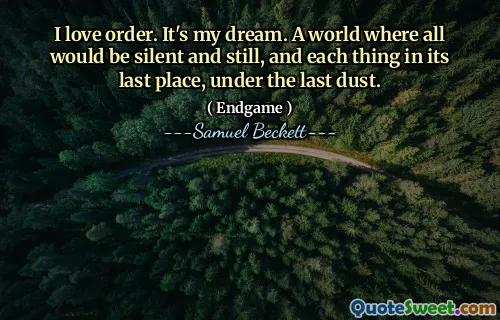Clov: If I don't kill the rat, he'll die.Hamm: That's right.
In Samuel Beckett's "Endgame," a poignant exchange occurs between two characters, Clov and Hamm, where Clov contemplates the necessity of taking action against a rat. Clov's statement “If I don't kill the rat, he'll die” captures the paradox of their existence, highlighting the struggle for control in a seemingly futile world. Hamm's agreement reinforces this idea, suggesting that inaction leads to inevitable outcomes, whether favorable or not.
This dialogue underscores the themes of existentialism and the interplay of agency and helplessness present throughout the play. It reflects the characters' absurd reality, where even mundane tasks carry deeper significance and emphasize the fragility of life within their stark environment.






